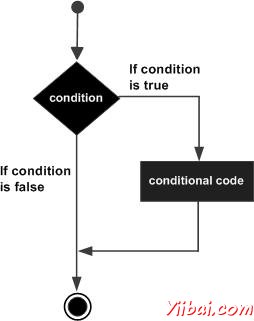D语言if语句
发布于 2015-08-16 14:44:07 | 112 次阅读 | 评论: 0 | 来源: 网络整理
if语句由一个布尔表达式后跟一个或多个语句。
语法
if语句在D编程语言的语法是:
if(boolean_expression)
{
/* statement(s) will execute if the boolean expression is true */
}
如果布尔表达式的值为true,那么代码的if语句内的模块将被执行。如果布尔表达式计算为false,那么第一组代码的if语句(右大括号后)结束后,将被执行。
D编程语言假定任何非零和非空值作为true,如果它是零或为null,则假定为false。
流程图:

例子:
import std.stdio;
int main ()
{
/* local variable definition */
int a = 10;
/* check the boolean condition using if statement */
if( a < 20 )
{
/* if condition is true then print the following */
writefln("a is less than 20" );
}
writefln("value of a is : %d", a);
return 0;
}
当上面的代码被编译并执行,它会产生以下结果:
a is less than 20;
value of a is : 10